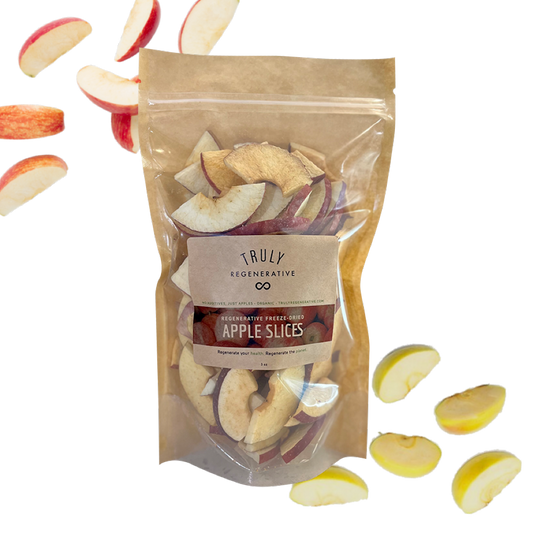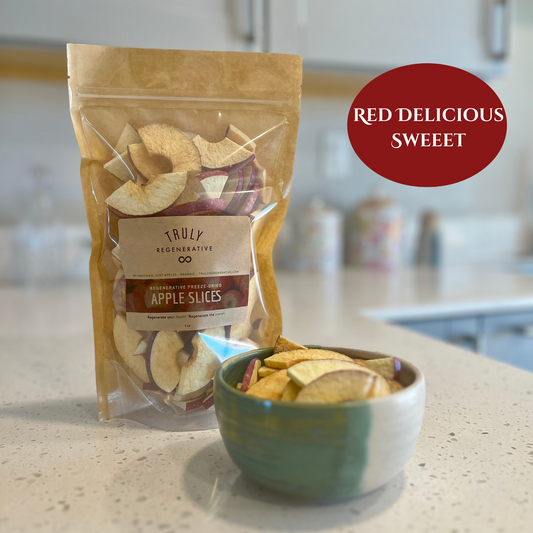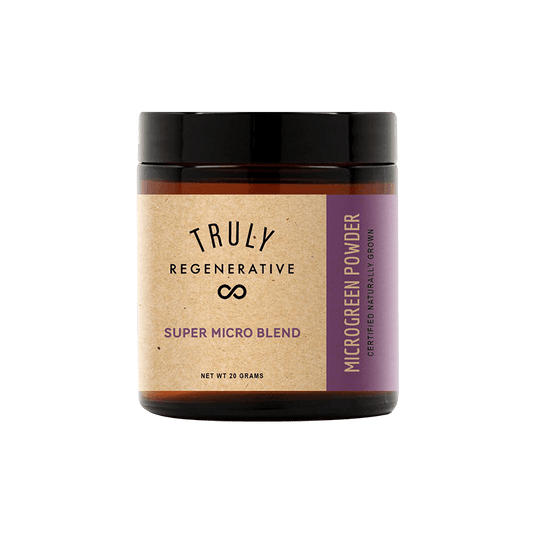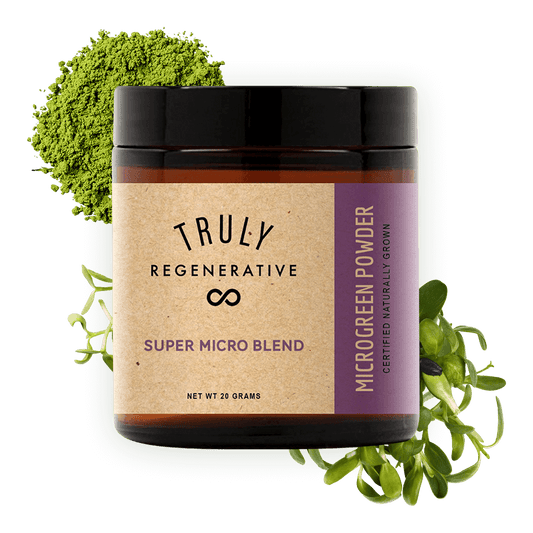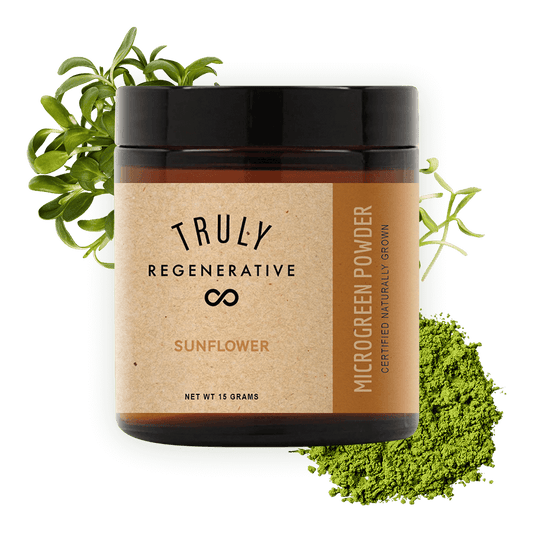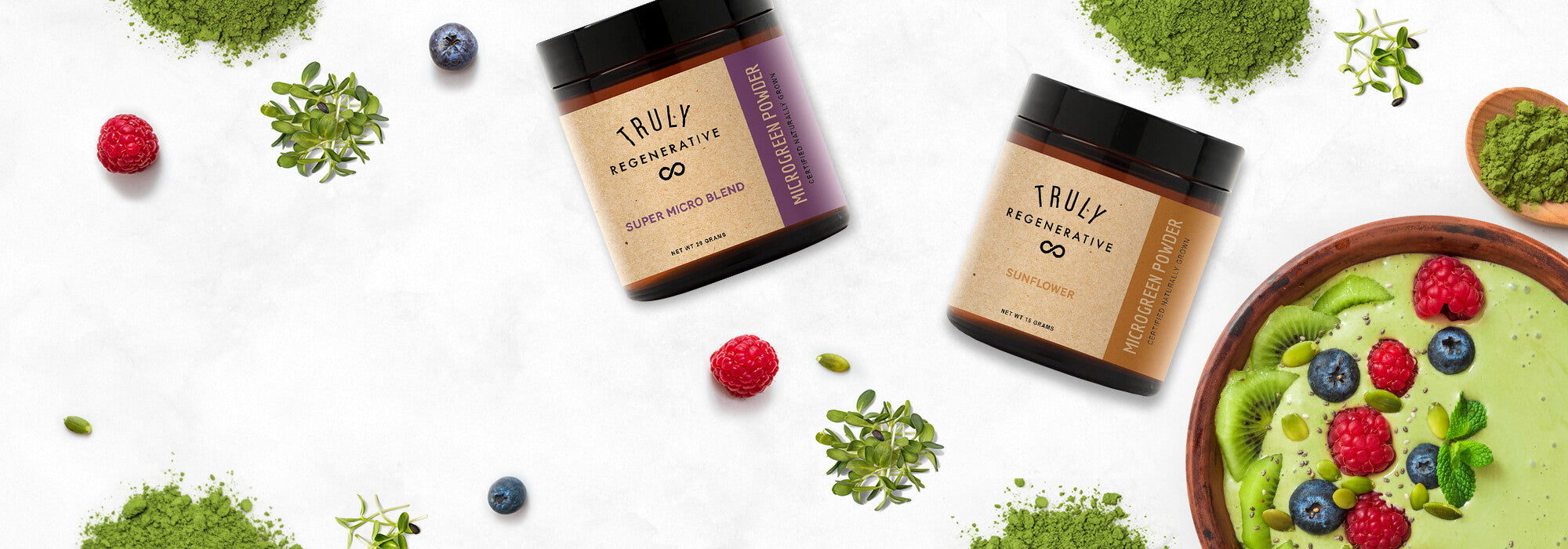
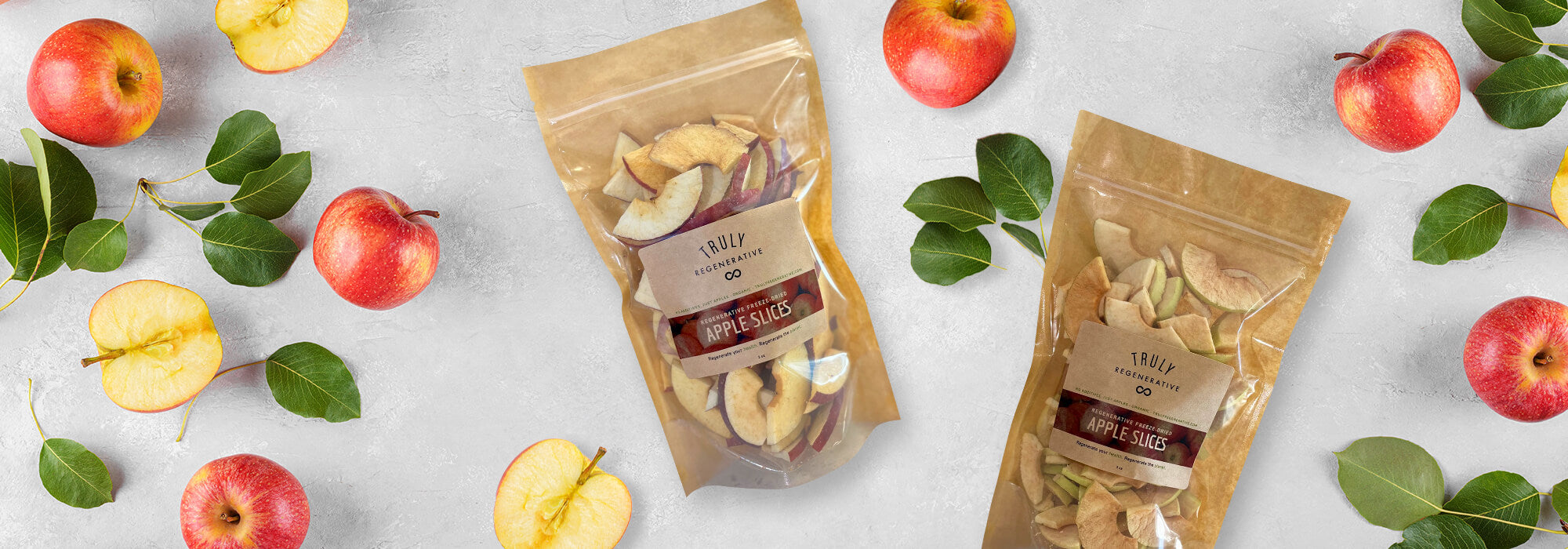
Best Sellers
-
Freeze-Dried Apples
Regular price $14.00 USDRegular priceUnit price / per -
Super Micro Blend
Regular price $35.00 USDRegular priceUnit price / per -
Sunflower Microgreen Powder
Regular price $30.00 USDRegular priceUnit price / per
Benefits of Regenerative Agriculture
At Truly Regenerative, we are committed to bringing you the highest quality regenerative organic products. Grown with regenerative agricultural practices, nature's innovation. With a focus on supporting small scale farmers who are leading the charge towards a better food system and a healthier future.
Collapsible content
Environmental Sustainability
Regenerative agriculture goes beyond the usual organic farming methods to rebuild and restore soil health. By practicing no-till farming, cover cropping, and crop rotation, we actively increase the soil's organic matter. Enhanced soil health not only sequesters more carbon from the atmosphere—aiding in the fight against climate change—but also makes the land more resilient against both drought and floods.
No-Till Farming
Traditional farming methods often involve tilling the soil, a process that breaks up the ground to prepare it for planting. While tilling may offer short-term benefits, such as easier planting and initial soil aeration, the long-term effects are detrimental. Tilling disrupts the soil structure, releases stored carbon into the atmosphere, and causes soil erosion. At Truly Regenerative, we practice no-till farming, allowing the soil to maintain its structure and vital ecosystem. This results in less soil erosion, greater water retention, and reduced carbon emissions, all crucial for environmental sustainability.
Cover Cropping
The practice of cover cropping involves planting specific crops primarily to manage soil quality, fertility, and weeds. These crops cover the soil when it would otherwise be bare, hence the term "cover cropping." By covering the soil, these plants help to prevent erosion, improve water infiltration, and increase organic matter. In addition to these benefits, the roots of cover crops create channels in the soil, which make it easier for subsequent crops to root deeply. This enables our microgreens to absorb nutrients more effectively, enhancing their nutritional profile and flavor.
Crop Rotation
The concept of crop rotation involves growing different types of crops in the same area in sequential seasons. This practice offers multiple environmental benefits, such as disrupting the lifecycle of pests and reducing soil-borne diseases, thereby diminishing the need for chemical pesticides and fertilizers. At Truly Regenerative, we implement a strategic crop rotation plan that enhances soil fertility and disrupts pest cycles. Crop rotation also improves soil structure and enhances its capacity to hold water and nutrients. This means less need for irrigation and synthetic fertilizers, thereby reducing our environmental footprint.
Carbon Sequestration and Climate Resilience
Enhanced soil health through regenerative agriculture practices not only boosts the nutrient density of our microgreens but also has significant environmental implications. Richer soil acts as a carbon sink, capturing carbon dioxide from the atmosphere and storing it in stable forms within the soil. This contributes to mitigating the greenhouse gas emissions responsible for climate change. Furthermore, healthy soil is more resilient to extreme weather events. Its enhanced water-holding capacity makes it more drought-resistant, while its improved structure reduces water runoff, mitigating the risks associated with floods.
Nutrient-Rich Produce
The soil is the foundation of all plant life, and healthier soil leads to more nutrient-rich produce. Our organic microgreens are a testament to this principle. Grown in rejuvenated soil full of beneficial microbes and essential nutrients, they are not just flavorsome but are nutrient powerhouses. The abundant minerals and vitamins present in our microgreens are more readily available and easier to absorb, offering a natural boost to your overall health.
Resource: Building Healthy Soil
Rich in Beneficial Microbes
Soil teeming with beneficial microbes acts as a vibrant ecosystem that aids in breaking organic matter, making essential nutrients more readily available for plant uptake. These microbes form symbiotic relationships with plant roots, enhancing their ability to absorb nutrients from the soil. The result is microgreens that are not just grown but are essentially "nurtured" in a thriving microbial environment, enriching them with a higher concentration of nutrients.
Enhanced Bioavailability
The term "bioavailability" refers to the proportion of nutrients that, once ingested, can be absorbed and utilized by the body. When plants grow in soil that is rich in organic matter and microbial life, they absorb nutrients in forms that are more bioavailable to humans. This means that when you consume our microgreens, your body can more easily absorb the vitamins and minerals they contain, offering a natural and efficient boost to your overall health.
Higher Concentrations of Vitamins and Minerals
Studies have shown that produce grown in healthy soil tends to contain higher concentrations of essential vitamins and minerals. Our regenerative agriculture practices ensure that the soil is replete with essential nutrients, which are then absorbed by our microgreens. This results in a richer product in vitamins like A, C, and E, and minerals like iron and magnesium. Consuming these nutrient-dense microgreens can support immune function, improve vision, boost cardiovascular health, and offer many other health benefits.
Presence of Phytonutrients
Phytonutrients are naturally occurring compounds found in plants that have been shown to provide various health benefits, such as antioxidant and anti-inflammatory properties. Due to our focus on soil health and organic practices, our microgreens are particularly rich in these beneficial compounds. Phytonutrients like flavonoids, carotenoids, and glucosinolates are abundant in our produce, contributing to a range of health benefits, from reducing the risk of chronic diseases to supporting overall well-being.
Amplified Flavor Profiles
Nutrient-rich soil doesn't just impact the health benefits of our produce; it also enhances its flavor. Plants grown in nutrient-rich soil often develop more complex flavor profiles, leading to tastier produce. Our microgreens offer a flavor depth that is not only enjoyable but also indicates the high nutrient content of the plant.
Economic Viability
Regenerative agriculture is not just good for the planet; it's also good for farmers and the economy. At Truly Regenerative, we have found that focusing on soil health reduces our dependency on synthetic fertilizers and pesticides, lowering our operational costs. In turn, this can make organic produce more affordable for consumers. Moreover, by improving the resilience of our crops to environmental stressors, we are also securing a more stable, long-term yield, which is economically beneficial for everyone involved in the supply chain.
Reduced Dependency on Synthetic Inputs
Conventional agricultural practices often rely heavily on synthetic fertilizers, pesticides, and herbicides. These inputs are not only costly but also require frequent applications, which add to labor costs. By practicing regenerative agriculture, we enrich the soil naturally through cover cropping, no-till farming, and crop rotation. This enhanced soil health negates the need for synthetic inputs, reducing our operational expenses. The cost savings are often passed down to the consumers, making organic, nutrient-rich produce more accessible.
Lower Irrigation Costs
Healthy soil has a better structure and higher organic matter, which improves its water-holding capacity. This reduces the need for frequent irrigation, thereby saving on water costs. It's not just about the cost of water itself; using less water also means lower energy costs for pumping and distributing water across the fields. By maintaining soil that requires less irrigation, we can significantly reduce one of the major operational costs associated with farming.
Resource: Vegetable Watering Guide
Resilience to Environmental Stressors
One of the inherent benefits of regenerative agriculture is the increased resilience it offers against environmental challenges like droughts, floods, and pests. A farm that is more resilient to such stressors is less likely to experience crop failures, ensuring a more consistent and reliable yield. This is crucial not just for our bottom line but also for the stability of supply chains and the assurance of continuous produce availability for consumers.
Potential for Carbon Credits
As regenerative agriculture gains recognition for its role in carbon sequestration, there is increasing potential for financial incentives through carbon credits. These credits can be sold on various carbon markets, providing an additional income stream for farmers practicing regenerative agriculture. While the market for agricultural carbon credits is still developing, the potential for future economic benefits in this area is promising.
Value-Added Products
The high nutrient density and enhanced flavor profile of our microgreens make them premium products that can command higher market prices. Consumers are increasingly willing to pay a premium for food products that are not only organic but also sustainably grown and nutritionally superior. This enables us to market our produce as a value-added product, further contributing to our economic viability.
Community and Health Impact
Agriculture doesn't exist in isolation; it is closely tied to the well-being of local communities. By abstaining from harmful chemicals and pesticides, we ensure that local waterways are not contaminated, safeguarding both human and aquatic life. Additionally, regenerative agriculture promotes biodiversity, which is not only crucial for the ecosystem but also improves the nutritional diversity available to the community. At Truly Regenerative, we proudly offer a product that catalyzes positive change in both the health and environmental sectors.
Resource: Regenerative Agriculture and Community Health
Protecting Local Water Quality
Conventional agricultural practices often rely on synthetic fertilizers and chemical pesticides, the runoff from which can contaminate local waterways. This poses a serious risk to both human health and aquatic life. By eliminating the use of these harmful substances, we significantly reduce the risk of water contamination. Clean water is a cornerstone of public health, impacting everything from drinking water safety to the health of local ecosystems. The regenerative practices we employ are not just good for our crops; they're good for our community.
Enhancing Biodiversity
One of the salient features of regenerative agriculture is its positive impact on biodiversity. By employing practices such as cover cropping and crop rotation, we create an environment where various life forms can thrive. This diversity is critical for the health of local ecosystems and contributes to greater resilience against pests and diseases. But biodiversity doesn't just impact flora and fauna; it also translates to a more diverse array of nutrients available in the local food supply. This nutritional diversity is crucial for the holistic health of the community.
Education and Awareness
At Truly Regenerative, we see ourselves as not just farmers but educators. The choices consumers make are often driven by the information available to them. We take pride in offering tours, workshops, and educational materials that help individuals understand the importance of regenerative agriculture. This knowledge empowers them to make informed decisions that benefit not only their health but also the planet's health.
Local Economic Impact
By focusing on sustainable and regenerative practices, we also contribute to the local economy. Reduced dependency on external inputs like synthetic fertilizers keeps more money circulating within the community. Furthermore, the quality and reputation of our produce can attract a premium in the market, and those proceeds are reinvested into local resources, whether that's hiring local labor, utilizing local services, or contributing to local environmental initiatives.
Community Well-being
It is increasingly acknowledged that there is a strong connection between the environment's health and human well-being. Regenerative agricultural practices contribute to cleaner air, water, and soil, which in turn support the mental and physical health of the community. Furthermore, the availability of nutrient-rich produce like our microgreens contributes directly to improved nutritional profiles and overall well-being of individuals within the community.
Ethical Considerations
Last but not least, regenerative agriculture is an ethically sound practice. It considers the welfare of all living beings, from the microorganisms in the soil to the farmers tending the fields. Here, at Truly Regenerativem we believe that food should be produced in a way that respects the intricate web of life, and our methods reflect this belief. When you choose our organic microgreens, you are not just making a healthy choice for yourself but also casting a vote for a more ethical and sustainable food system.
Resource: The Ethics of Regenerative Agriculture
Soil Microorganisms Welfare
At the foundation of every thriving ecosystem are countless microorganisms that play a crucial role in nutrient cycling, soil structure, and plant health. By refraining from the use of synthetic fertilizers and pesticides, we protect these microorganisms, acknowledging their integral role in a balanced ecosystem. Healthy soil teeming with microbial life is not an accident; it's an ethical choice we make to honor the smallest beings that sustain our fields.
Fair Treatment of Farm Workers
Ethical agriculture extends to human beings as well—particularly those who labor to bring food from the field to the table. At Truly Regenerative, we are committed to providing fair wages, decent working conditions, and a safe environment for our farm workers. Our ethical stance promotes not only environmental health but social justice, fostering a culture of respect and dignity for everyone involved in the farming process.
Animal Welfare and Biodiversity
Regenerative agriculture practices contribute to habitats where animals can thrive. By maintaining natural landscapes and avoiding harmful pesticides and fertilizers, we provide a healthier environment for both domesticated and wild animals. This ethical approach to farming recognizes the intrinsic value of all life forms and contributes to a more balanced and biodiverse ecosystem.
Consumer Health and Transparency
We believe that consumers have a right to know how their food is grown. Transparency in our farming methods is not just a marketing strategy; it's an ethical obligation. By providing clear information about our regenerative agricultural practices, we empower you to make informed choices that align with your values and health goals.
Sustainability for Future Generations
Ethical considerations are not just about the here and now; they encompass the kind of world we want to leave for future generations. By adopting regenerative agriculture practices, we're contributing to long-term environmental sustainability. Our methods help mitigate climate change, preserve natural resources, and enhance biodiversity, ensuring that future generations inherit a planet that is as fertile and abundant as the one we enjoy today.

Our Story
Regenerative Agriculture
Regenerative agriculture helps the soil revive, plants thrive, and your health improve.
Guides
View all-

How to Properly Store Freeze-Dried Microgreen P...
Discover how to properly store freeze-dried microgreen powder to retain freshness and nutrients. Maximize your superfood's potential.
How to Properly Store Freeze-Dried Microgreen P...
Discover how to properly store freeze-dried microgreen powder to retain freshness and nutrients. Maximize your superfood's potential.
-

Freeze-Dried Food for Busy Families
Discover the convenience of freeze-dried food for busy families at Truly Regenerative™️. Healthy, quick meals await!
Freeze-Dried Food for Busy Families
Discover the convenience of freeze-dried food for busy families at Truly Regenerative™️. Healthy, quick meals await!
-

Unleashing the Power of Microgreens: Nature's N...
Discover the regenerative potential of microgreens in our latest blog. Unlock health and sustainability in every bite. Explore now!
Unleashing the Power of Microgreens: Nature's N...
Discover the regenerative potential of microgreens in our latest blog. Unlock health and sustainability in every bite. Explore now!
Recipes
-

Christmas Caramel Apple Trail Mix
Enjoy a festive treat with our Christmas Caramel Apple Trail Mix recipe, featuring organic, sustainable freeze-dried apples and holiday joy!
Christmas Caramel Apple Trail Mix
Enjoy a festive treat with our Christmas Caramel Apple Trail Mix recipe, featuring organic, sustainable freeze-dried apples and holiday joy!
-

Avocado Toast with Sunflower Microgreen Powder
When it comes to providing high-quality organic microgreens, we at Truly Regenerative pride ourselves on our commitment to sustainability and quality. Our microgreens are cultivated through innovative techniques in regenerative...
Avocado Toast with Sunflower Microgreen Powder
When it comes to providing high-quality organic microgreens, we at Truly Regenerative pride ourselves on our commitment to sustainability and quality. Our microgreens are cultivated through innovative techniques in regenerative...
-

Sunflower Microgreen Powder Smoothie
Experience the unparalleled freshness and nutritional potency of Truly Regenerative's organic Sunflower Microgreen Powder. We are thrilled to present this simple yet sumptuous smoothie recipe that accentuates the delightful flavors...
Sunflower Microgreen Powder Smoothie
Experience the unparalleled freshness and nutritional potency of Truly Regenerative's organic Sunflower Microgreen Powder. We are thrilled to present this simple yet sumptuous smoothie recipe that accentuates the delightful flavors...

